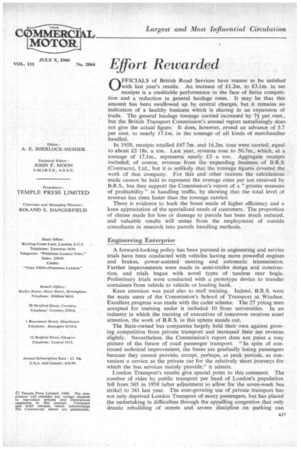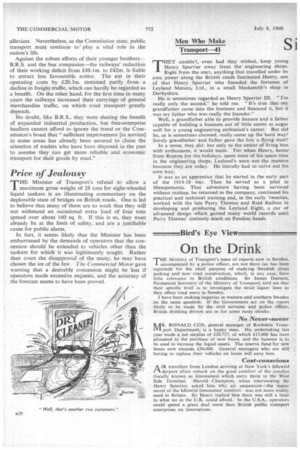Effort Rewarded
Page 31

Page 32

If you've noticed an error in this article please click here to report it so we can fix it.
OFFICIALS of British ,Road Services have reason to be satisfied with last year's results. An increase of £1.2m. to £3.1m. in net receipts is a creditable performance in the face of fierce competition and a reduction in general haulage rates. It may be that this amount has been swallowed up by central charges, but it remains an indication of a healthy business which is sharing in an expansion of trade. The general haulage tonnage carried increased by 71 percent., but the British Transport Commission's annual report tantalizingly does not give the actual figure. It does, however, reveal an advance of 5.7 per cent. to nearly 17.1m. in the tonnage of all kinds of merchandise handled.
In 1958, receipts totalled £47.7m. and 16.2m. tons were carried, equal to about £2.18s. a ton. Last year, revenue rose to 503m., which, at. a tonnage of 17.1m., represents nearly £3 a ton. Aggregate receipts included, of course, revenue from the expanding business of B.R.S. (Contracts), Ltd., but it is unlikely that the tonnage figures covered Atte work of that company. For this and other reasons the calculations made cannot be held to represent the average rates per ton received by B,R.S., but they support the Commission's report of a "greater measure of profitability" in handling traffic, by showing that the total level of revenue has risen faster than the tonnage carried.
There is evidence to back the boast made of higher efficiency and a keen appreciation of the specialized needs of customers. The proportion of claims made for loss or damage to parcels has been much reduced, and valuable results will ensue from the employment of outside consultants in research into parcels handling methods.
Engineering Enterprise
A forward-looking policy has been pursued in engineering and service trials have been conducted with vehicles having more powerful engines and brakes, power-assisted steering and automatic transmission. Further improvements were made in semi-trailer design and construction, and trials began with novel types of tandem rear bogie. Preliminary trials were conducted with a prototype device to transfer containers from vehicle to vehicle or loading bank.
Keen attention was paid also to staff training. Indeed, B.R.S. were the main users of the Commission's School of Transport at Windsor. Excellent progress was made with the cadet scheme. The 27 young men accepted for training under it included 10 from universities. In an industry in which the training of executives of tomorrow receives scant attention, the work of B.R.S. in this sphere stands out.
The State-owned bus companies largely held their own against growing competition from private transport and increased their net revenue, slightly. Nevertheless, the Commission's report does not paint a rosy picture of the future of road passenger transport. "In spite of continued technical improvenient, the buses are gradually losing passengers because they cannot provide, except, perhaps, at peak periods, as convenient a service as the private car for the relatively short journeys for Which the bus services mainly provide," it admits.
London Transport's results give special point to this comment. The number of rides by public transport per head of London's population fell from 365 in 1958 (after adjustment to allow for the seven-week bus strike) to 341 last year. The ever-growing use of private transport has not only deprived London Transport of many passengers, but has placed the undertaking in difficulties through the appalling congestion that only drastic rebuilding of streets and severe discipline on parking can alleviate. Nevertheless, as the Commission state, public transport must continue to play a vital role in the nation's life.
Against the robust efforts of their younger brothersB.R.S. and the bus companies—the railways' reduction of their working deficit from £48.1m. to £42m. is liable to attract less favourable notice. The cut in their operating costs by £20.3m. stemmed partly from a decline in freight traffic, which can hardly be regarded as a benefit. On the other hand, for the first time in many years the railways increased their carryings of general merchandise traffic, on which road transport greatly depends.
No doubt, like B.R.S., they were sharing the benefit of expanded industrial production, but free-enterprise hauliers cannot afford to ignore the trend or the Commission's boast that " sufficient improvement [in servicel in some areas has already been secured to claim the attention of traders who have been disposed in the past to assume they can get more reliable and economic transport for their goods by road."
Price of Jealousy
THE Minister of Transport's refusal to allow a maximum gross weight of 28 tons for eight-wheeled liquid tankers is an illuminating commentary on the deplorable state of bridges on British roads. One is led to believe that many of them are so weak that they will not withstand an occasional extra load of four tons spread over about 160 sq. ft. If this is so, they must already be at the limit of safety, and are a justifiable cause for public alarm.
In fact, it seems likely that the Minister has been embarrassed by the demands of operators that the concession should be extended to vehicles other than the tankers for which it was legitimately sought. Rather than court the disapproval of the many, he may have chosen the ire of the few. The Commercial Motor gave warning that a desirable concession might be lost if operators made excessive requests, and the accuracy of the forecast seems to have been proved.








































































































